Tailieumoi.vn sưu tầm và biên soạn bài tập Các thì trong Tiếng Anh có đáp án chi tiết, gồm 50 bài tập từ cơ bản đến nâng cao mong muốn giúp các em ôn luyện kiến thức đã được học về Các thì trong Tiếng Anh hiệu quả. Mời các bạn đón xem:
Bài tập Các thì trong Tiếng Anh
A. Các thì trong Tiếng Anh
1. Thì hiện tại đơn
Thì hiện tại đơn (Present Simple) là thì diễn tả hành động chung chung, tổng quát lặp đi lặp lại nhiều lần một sự thật hiển nhiên hoặc một hành động diễn ra trong thời gian hiện tại.

1. Công thức
Động từ thường:
|
Dạng câu |
Công thức - ví dụ |
|
Khẳng định (+) |
S + V (s/es)+ O Ví dụ: She watches TV. |
|
Phủ định (-) |
S+ do/does + not + V (Infinitive) + O Ví dụ: I don’t know her. |
|
Nghi vấn (?) |
Do/does + S + V (Infinitive)+ O? Ví dụ: Do you love me? |
Đối với động từ Tobe:
|
Câu |
Công thức - ví dụ |
|
Khẳng định (+) |
S + is/am/are + N/Adj Ví dụ: I am a girl. |
|
Phủ định (-) |
S + am/are/is + NOT + N/Adj Ví dụ: I am not a student, i am a teacher. |
|
Nghi vấn (?) |
Am/are/is + S + N/Adj Ví dụ: Are they happy? |
*Lưu ý:
- Những từ có tận cùng là "o", "ch", "sh", "x", "s" thì khi dùng với ngôi thứ ba số ít hãy thêm đuôi "es" (Ví dụ: do – does; watch – watches; fix – fixes, go – goes; miss – misses, wash - washes,...).
- Những từ có tận cùng là "y" thì khi dùng với ngôi thứ 3 số ít, bỏ "y" và thêm đuôi "ies" (Ví dụ: copy – copies; study – studies,...) trừ một số từ ngoại lệ như "buy", "play",...
- Những từ còn lại, thêm đuôi "s" (Ví dụ: see – sees; play – plays,…)
2. Cách dùng
Thì hiện tại đơn được dùng:
- Diễn tả một chân lý, sự thật hiển nhiên (Ví dụ: The Earth orbits around the Sun).
- Diễn tả một thói quen, sở thích hoặc sự việc lặp đi lặp lại hàng ngày (Ví dụ: He goes to school by bike).
- Thể hiện khả năng của một ai đó (Ví dụ: She studies very well).
3. Dấu hiệu nhận biết
Trong câu hiện tại đơn có xuất hiện những trạng từ chỉ tần suất như: Always (luôn luôn), usually (thường xuyên), often (thường xuyên), sometimes (thi thoảng), seldom (hiếm khi), rarely (hiếm khi), hardly (khó), never (không bao giờ),... Hoặc từ every (every day, every week, every month,...)
4. Bài tập
Điền dạng đúng của động từ trong ngoặc
- She always ______delicious meals. (make)
- Tome______eggs. (not eat)
- They______do the homework on Sunday (do)
- He ______ a new T-shirt today (buy)
- My mom______shopping every week. (go)
- ______Duong and Hoa ______ to work by bus every day? (go)
- _____ your parents ______with your decision? (agree)
- My sister ______ her hair every day (wash)
Police ______ robbers (catch)
Đáp án:
- Makes
- Does not eat
- Don't
- Buys
- Goes
- Do – go
- Do – agree
- Washes
- Catch
2. Thì hiện tại tiếp diễn
Thì hiện tại tiếp diễn (Present Continuous) là thì dùng để diễn tả một hành động xảy ra ở thời điểm hiện tại, đang diễn ra và kéo dài dài một thời gian ở hiện tại.
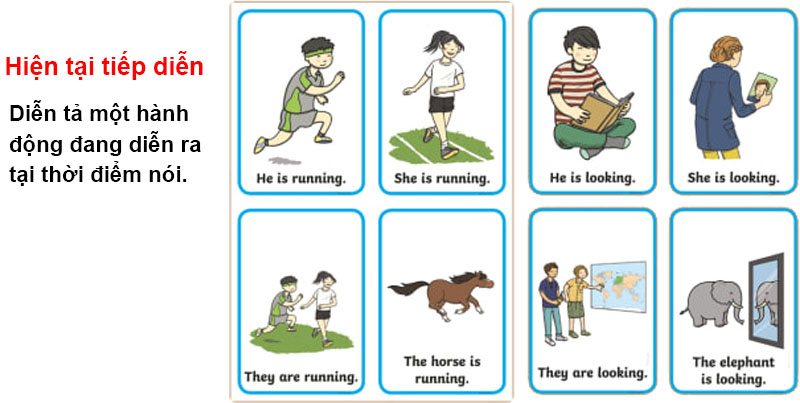
1. Công thức
|
Dạng câu |
Công thức - ví dụ |
|
Khẳng định (+) |
S +am/is/are + V-ing Ví dụ: I am writing an essay. |
|
Phủ định (-) |
S + am/is/are not + V-ing Ví dụ: She is not studying now. |
|
Nghi vấn (?) |
Am/is/are + S + V-ing Ví dụ: Are they sleeping? |
Thì hiện tại tiếp diễn không chia động từ tobe.
2. Cách dùng
- Diễn tả một hành động đang diễn ra tại thời điểm nói (Ví dụ: He is going home.).
- Diễn tả hành động đang diễn ra, có thể không phải ở thời điểm nói (Ví dụ: I am reading the book "The thorn bird".).
- Diễn tả hành động được lên lịch, sắp xảy ra trong tương lai gần (Ví dụ: He is going to school tomorrow.).
- Diễn tả sự việc lặp đi lặp lại gây khó chịu. Câu này mang tính than phiền, phàn nàn, có động từ chỉ tần suất kèm theo (Ví dụ: He is always coming late.).
- Mô tả cái gì đó đổi mới, phát triển hơn (Ví dụ: The children are growing quickly.).
*Lưu ý: Các bạn không dùng thì hiện tại tiếp diễn với các từ thể hiện nhận thức, cảm xúc như: Be, see, hear, feel, realize, seem, remember, forget, understand, know, like, want, glance, smell, love, hate,...
3. Dấu hiệu nhận biết
- Đi cùng với các trạng từ chỉ thời gian như: Now, at the moment, it’s + giờ cụ thể + now.
- Có các động từ: Look, watch, listening, keep silent,...
4. Bài tập
- My/ dad/ water/ some plants/ the/ garden.
________________________
- My/ mom/ clean/ floor/.
________________________
- Mary/ have/ lunch/ her/ friends/ a/ restaurant.
________________________
- They/ ask/ a/ man/ about/ the/ way/ the/ railway/ station.
________________________
- My/ student/ draw/ a/ beautiful/ picture
________________________
Đáp án:
- My dad is watering some plants in the garden.
- My mom is cleaning the floor.
- Mary is having lunch with her friends in a restaurant.
- They are asking a man about the way to the railway station.
- My student is drawing a (very) beautiful picture.
3. Thì hiện tại hoàn thành
Thì hiện tại hoàn thành (Present Perfect) là thì dùng để diễn đạt hành động xảy ra ở một thời điểm không xác định trong quá khứ.
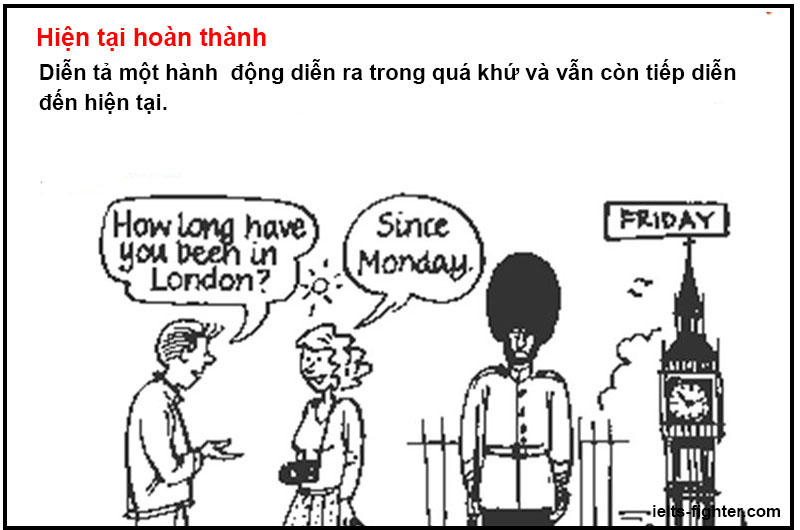
1. Công thức
|
Dạng câu |
Công thức - ví dụ |
|
Khẳng định (+) |
S + have/has + V3 Ví dụ: I have cooked for 2 hours. |
|
Phủ định (-) |
S + have/has not + V3 Ví dụ: She hasn’t met her mother since April. |
|
Nghi vấn (?) |
Have/has + S + V3 Ví dụ: Have you arrived in American yet? |
2. Cách dùng
- Diễn tả hành động diễn ra trong quá khứ và vẫn còn tiếp diễn đến hiện tại (Ví dụ: I have lived in Ha Noi for 5 years.).
- Diễn tả hành động đã hoàn thành tính đến thời điểm hiện tại nhưng không rõ thời gian kết thúc (Ví dụ: She has written three books and now she is working on the fourth one.).
- Diễn tả sự kiện quan trọng trong đời (Ví dụ: This is the happiest party that I’ve been to.).
- Dùng để chỉ kết quả. (Ví dụ: I have finished my homework.).
- Diễn tả kinh nghiệm, trải nghiệm tính đến thời điểm hiện tại (Ví dụ: Have you ever been to American?).
3. Dấu hiệu nhận biết
Những từ xuất hiện trong thì này như: Just - Recently - Lately, Already, Before, Ever, Never, For, Since, Yet, So far - Until now - Up to now - Up to the present.
4. Bài tập:
Chia động từ trong ngoặc:
- They ______a new lamp. (buy)
- We ______our holiday yet. (not/ plan)
- He just ______ out for 2 hours (go)
- I ______ my plan (not/finish)
- ______ you ______ this lesson yet? ( learn)
Viết lại câu:
This last time she came back to her hometown was 4 years ago.
=> She hasn't______
- He started working as a bank clerk 3 months ago.
=> He has______
- It is a long time since we last met.
=> We haven't______
Đáp án:
Chia động từ:
- Have bought
- Haven't planned
- Has gone
- Haven't finished
- Have - learned
Viết lại câu:
- She hasn't come back home for 4 years.
- He has worked as a bank clerk for 3 months.
- We haven't met each other for a long time.
4. Thì hiện tại hoàn thành tiếp diễn
Thì hiện tại hoàn thành tiếp diễn (Present Perfect Continuous) là thì dùng để chỉ hành động vẫn tiếp diễn ở hiện tại, có khả năng xảy ra trong tương lai.
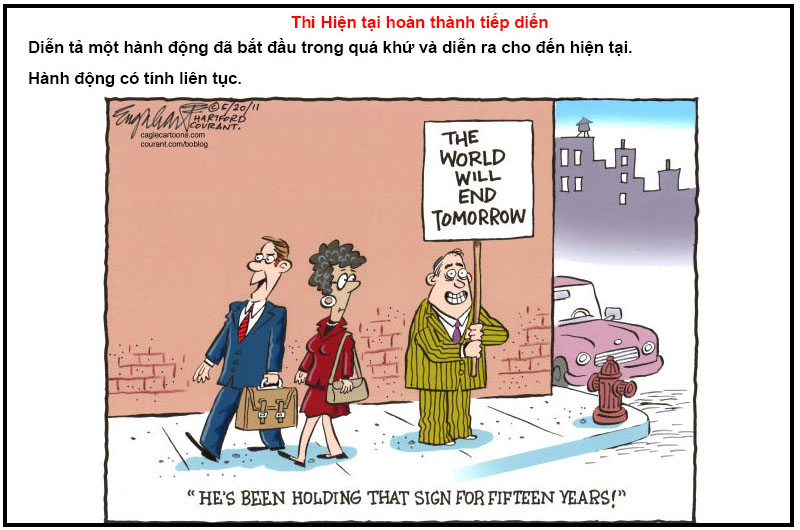
1. Công thức
|
Dạng câu |
Công thức - ví dụ |
|
Khẳng định (+) |
S + have/has been + V-ing + O Ví dụ: I have been going to school |
|
Phủ định (-) |
S + hasn’t/ haven’t + been + V-ing + O Ví dụ: They haven’t been working together. |
|
Nghi vấn (?) |
Has/have + S + been + V-ing + O Ví dụ: Have you been traveling to HCM City? |
2. Cách dùng
- Được dùng diễn tả một hành động đã bắt đầu trong quá khứ và diễn ra cho đến hiện tại. Hành động có tính liên tục (Ví dụ: I have been walking on this street for more than 1 hours.).
- Thì hiện tại hoàn thành tiếp diễn nhấn mạnh vào quá trình còn thì hiện tại hoàn thành thì nhấn mạnh vào kết quả, các bạn lưu ý nhé.
Thì hiện tại hoàn thành tiếp diễn cũng tương tự các thì tiếp diễn, sẽ không dùng được với các động từ chỉ trạng thái, cảm xúc, động từ không mang tính kéo dài, khi chỉ số lượng, số lần.
3. Dấu hiệu nhận biết
Đó là: all (day, week…), since, for,... Lưu ý cách dùng ở trên cho thì hiện tại hoàn thành. Một số từ khác: Recently, lately, in the past, in recent years, up until now, and so far,... Hoặc "how long (bao lâu)":
- Since + mốc thời gian. Ex: since 2000
- For + khoảng thời gian Ex: for 3 years
4. Bài tập
- Where is she? I (wait)______ for her since 5 o’clock!
- He (go) ______out since 5 a.m.
- How long you (study) ______ English? For 5 years
- Why are your hands so dirty? - I (repair)______ my bike
Đáp án:
- have been waiting
- has been going
- have you been studying
- have been repairing
5. Thì quá khứ đơn
Quá khứ đơn (Past Simple) là thì dùng để diễn đạt một hành động đã xảy ra và kết thúc tại một thời điểm xác định trong quá khứ
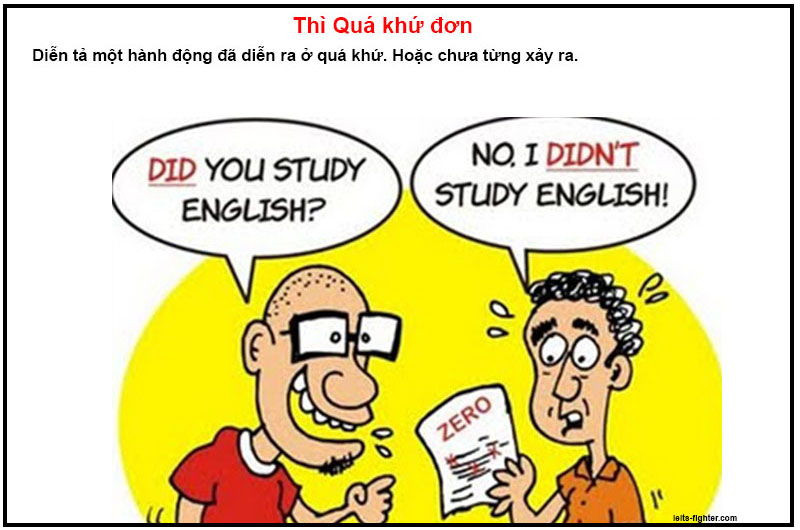
1. Công thức
Đối với động từ tobe:
|
Dạng câu |
Công thức - ví dụ |
|
Khẳng định (+) |
S + Was/were + N/adj Ví dụ: I was a good student. |
|
Phủ định (-) |
S + was/were not + N/adj Ví dụ: She wasn’t a beautiful girl. |
|
Nghi vấn (?) |
Was/were + S + N/adj Ví dụ: Were you a good cook? |
Đối với động từ:
|
Dạng câu |
Công thức - ví dụ |
|
Khẳng định (+) |
S + V (ed) + O Ví dụ: I used to study in Chu Van An High Shool |
|
Phủ định (-) |
S + did n’t + O Ví dụ: We didn’t go to the cinema. |
|
Nghi vấn (?) |
Did +S + Verb Ví dụ: Did you do homework? |
2. Cách dùng
- Diễn tả một hành động đã diễn ra ở quá khứ. Hoặc chưa từng xảy ra (Ví dụ: She went to Hanoi 3 years ago.).
- Diễn đạt những hành động xảy ra liên tiếp trong quá khứ (Ví dụ: She came home, switched on the computer and checked her e-mails. (Cô ấy đã về nhà và bật máy tính và kiểm tra email.).
- Diễn đạt một hành động chen vào một hành động đang diễn ra (Ví dụ: When I was studying, my mom went home.).
- Dùng cho câu điều kiện loại 2 (Ví dụ: If I had one hour, I would finish this essay.).
3. Dấu hiệu nhận biết
Các từ thường xuất hiện: Ago, at the past, last,…
4. Bài tập
- I _____ at home last weekend. (stay)
- Angela ______ to the cinema last night. (go)
- I and my friends ______ a great time in Nha Trang last year. (have)
- My vacation in Hue last summer ______ wonderful. (be)
Đáp án
- Stayed
- Went
- have
- was.
6. Thì quá khứ tiếp diễn
Quá khứ tiếp diễn (Past Continuous) là thì dùng để diễn tả một hành động xảy ra trong quá khứ nhưng có một hành động khác xen vào.
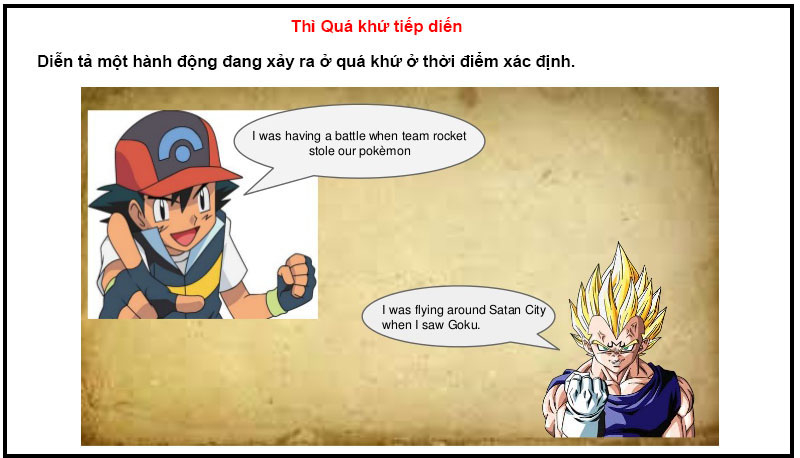
1. Công thức
|
Dạng câu |
Công thức - ví dụ |
|
Khẳng định (+) |
S + was/were + V-ing + O Ví dụ: We were playing basketball at 9 o’clock yesterday. |
|
Phủ định (-) |
S + was/were not + V-ing + O Ví dụ: I wasn’t playing basketball at 9 o’clock yesterday. |
|
Nghi vấn (?) |
Was/Were + S + V-ing + O? Ví dụ: Was he playing basketball at 9 o’clock yesterday? |
2. Cách dùng
- Diễn tả một hành động đang xảy ra ở quá khứ ở thời điểm xác định. Hãy nhớ thời điểm xác định thì mới dùng thì này nhé.
- Diễn tả một hành động đang xảy ra thì hành động khác xen vào ở quá khứ. Hành động xen vào là thì quá khứ đơn, hành động diễn ra là thì quá khứ tiếp diễn (Ví dụ: I was having lunch when my mom came home.).
3. Dấu hiệu nhận biết
Trong câu có những từ: While, when, as, at 10:00 (giờ) last night,...
Ví dụ: I went home while she was watching the news on TV.
4. Bài tập:
- Tom (walk)___________down the street when it began to rain.
- At this time last year, he (attend)__________an English course.
- We (stand) ________ under the tree when he heard an explosion.
- The boy fell and hurt himself while he (ride)_________ a bicycle.
Đáp án:
- Was walking
- Was attending
- Were standing
- Was riding
7. Thì quá khứ hoàn thành
Quá khứ hoàn thành (Past Perfect) là thì diễn tả một hành động đã xảy ra và kết thúc trong quá khứ trước một hành động khác cũng xảy ra và kết kết thúc trong quá khứ.
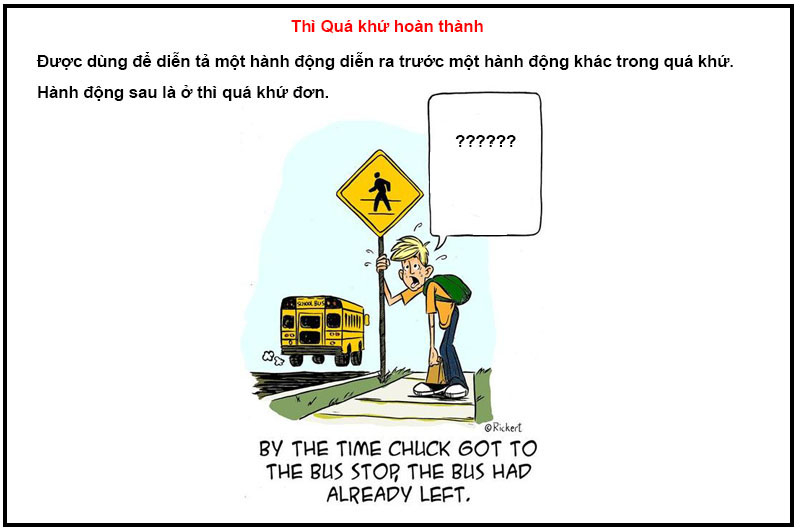
1. Công thức
|
Dạng câu |
Công thức - ví dụ |
|
Khẳng định (+) |
S + had + Vpp Ví dụ: He had gone out when i came intro the house. |
|
Phủ định (-) |
S + hadn't + Vpp Ví dụ: She hadn't come home when i got there. |
|
Nghi vấn (?) |
Had + S + Vpp? Ví dụ: Had the film ended when you arrived at the cinema? |
2. Cách dùng
Được dùng để diễn tả một hành động diễn ra trước một hành động khác trong quá khứ. Hành động sau là ở thì quá khứ đơn. Bạn có thể hình dung theo thứ tự là quá khứ hoàn thành – quá khứ đơn – hiện tại đơn nhé. Cụ thể, thì quá khứ hoàn thành được dùng để:
- Diễn tả một hành động diễn ra trước một hành động khác trong quá khứ (Ví dụ: We had had lunch before we went to school.).
- Một hành động diễn ra trước một thời điểm khác trong quá khứ (Ví dụ: When my father checked, I had finished my homework.).
- Hành động xảy ra để dẫn đến hành động khác (Ví dụ: He had lost 10 kg and became a handsome man.).
- Diễn tả điều kiện không có thực trong câu điều kiện loại 3 (Ví dụ: If we had been invited, we would have come to her party.).
3. Dấu hiệu nhận biết
Sử dụng thì quá khứ hoàn thành thường đi kèm với thì quá khứ đơn. Các từ thường xuất hiện:
- Before, after, Until then, by the time, prior to that time, for, as soon as, by,...
- When, when by, by the time, by the end of + time in the past,…
*Lưu ý:
- QKHT + before + QKĐ.
- After + QKHT, QKĐ.
4. Bài tập
- I (go) ______ home after I (finish) ______ my work.
- He said that he (already, see) ______ Dr. Rice.
- After taking a bath, she (go) ______ to bed.
-. They told me they (not/eat) ______ such kind of food before.
Đáp án:
- went – had finished
- had already seen
- went
- hadn’t eaten
8. Thì quá khứ hoàn thành tiếp diễn
Quá khứ hoàn thành tiếp diễn (Past Perfect Continuous) là thì dùng để diễn ta một hành động đã xảy ra trong quá khứ và kết thúc trước một hành động khác xảy ra và cũng kết thúc trong quá khứ.
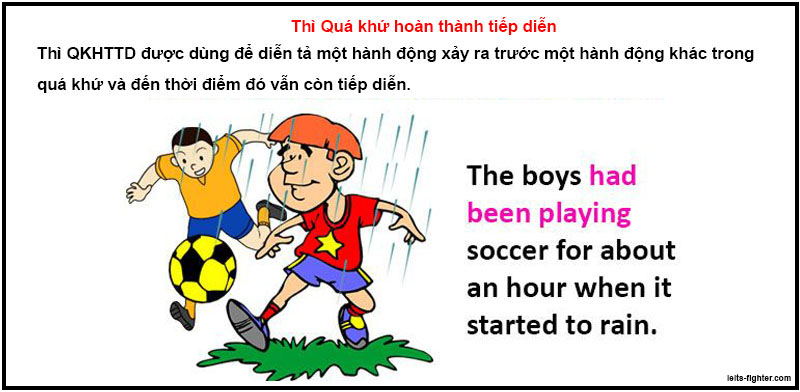
1. Công thức
|
Dạng câu |
Công thức - ví dụ |
|
Khẳng định |
S + had been + V-ing Ví dụ: I had been studying IELTS for 1 year and prepared for a test. |
|
Phủ định |
S +hadn't been + V-ing Ví dụ: I hadn't been studying hard until I got a really bad score on the test yesterday. |
|
Nghi vấn |
Had + S + been + V-ing? Ví dụ: Had you been watching TV before I went home? |
2. Cách dùng
- Thì quá khứ hoàn thành tiếp diễn được dùng để diễn tả một hành động xảy ra trước một hành động khác trong quá khứ và đến thời điểm đó vẫn còn tiếp diễn (Ví dụ: I had been doing my homework before my dad called me.).
- Diễn tả hành động kéo dài liên tục trước một hành động khác trong quá khứ. (Ví dụ: They had been talking for 2 hour about this problem before he gave a solution.).
- Diễn tả hành động xảy ra để chuẩn bị cho hành động khác tiếp theo. Nhấn mạnh tính liên tục (Ví dụ: They had been dating for 2 years and prepared for a wedding.).
- Diễn tả một hành động kéo dài liên tục trước một thời điểm xác định trong quá khứ. (Ví dụ: We had been walking for 3 hours before went home at 9.pm last night.).
- Nhấn mạnh hành động để lại kết quả trong quá khứ (Ví dụ: Yesterday morning, he was exhausted because he had been working on his report all night.).
- Thì quá khứ hoàn thành tiếp diễn cũng có thể sử dụng cho câu điều kiện loại 3 như thì quá khứ hoàn thành ở trên (Ví dụ: If we had been preparing better, we would have got good grades.).
3. Dấu hiệu nhận biết
Các từ thường xuất hiện trong câu: Until then,By the time, Prior to that time, Before, after,...
4. Bài tập
- It was very noisy next door. Our neighbours ….(have) a party.
- Tam and I went for a walk. I had difficulty keeping up with him because he … (walk) so fast
- Tim was sitting on the ground. He was out of breath. He … (run)
- When Phuong arrived, everybody was sitting round the table with their mouths full. They … (eat)
Đáp án:
- were having
- was walking
- had been running
- were eating
9. Thì tương lai đơn
Tương lai đơn (Future Simple) là thì dùng để diễn tả một hành động sẽ xảy ra trong tương lai nhưng không xác định rõ thời gian.
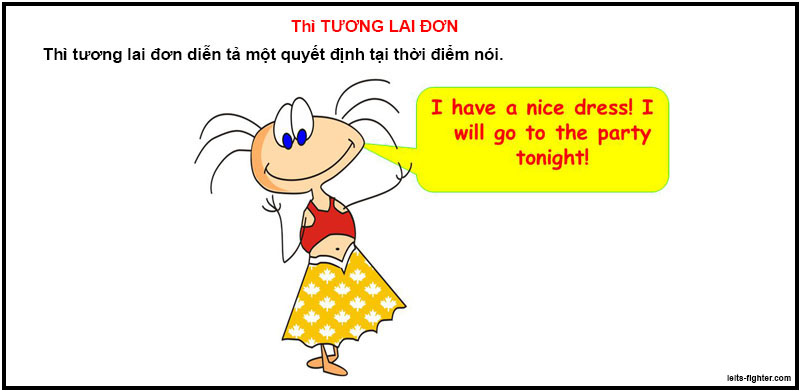
1. Công thức
Với động từ thường
|
Dạng câu |
Công thức - ví dụ |
|
Khẳng định |
S + will + verb Ví dụ: I will clean my room. |
|
Phủ định |
S + will not + verb He will not go to school with her. |
|
Nghi vấn |
Will + S + verb? Ví dụ: Will you read this book? |
Với động từ tobe
|
Dạng câu |
Công thức - ví dụ |
|
Khẳng định |
S + will + be + N/adj Ví dụ: He will be a good husband. |
|
Phủ định |
S + will not + be + N/adj Ví dụ: I will not be angry if you can do it. |
|
Nghi vấn |
Will + S + be Ví dụ: Will you be home tonight? |
*Lưu ý: will not = won’t
2. Cách dùng
- Thì tương lai đơn diễn tả một quyết định tại thời điểm nói.
Ví dụ: I will go home in 2 days.
- Dùng để đưa ra lời yêu cầu, đề nghị, lời mời.
Ví dụ: Will you go home with me tonight?
- Dùng để đưa ra lời hứa hẹn: Ai đó sẽ làm gì.
Ví dụ: I will do my homework tomorrow.
3. Dấu hiệu nhận biết
Trạng từ chỉ thời gian: in + thời gian, tomorrow, Next day, Next week/ next month/ next year…
Động từ thể hiện khả năng sẽ xảy ra:
- think/believe/suppose/…: nghĩ/tin/cho là/...
- perhaps: có lẽ
- probably: có lẽ
- Promise: hứa
4. Bài tập
________________________
________________________
________________________
______________________________
______________________________
Đáp án:
- I hope that you will come to my house tomorrow.
- He will finish his poem in 5 days.
- If he doesn’t study hard, he won’t pass final exam.
- You look tired, so I will bring you something to eat.
- Will you please close the door?
10. Thì tương lai gần
Tương lai gần (Near Future) là thì dùng để diễn tả một hành động sẽ xảy ra trong tương lai đã được dự định kế hoạch từ trước hoặc một dự đoán có căn cứ cụ thể.
Thì tương lai gần khá giống với tương lai đơn nhưng thì này được dùng để diễn tả một hành động, sự kiện đã có dự định từ trước chứ không phải bộc phát.
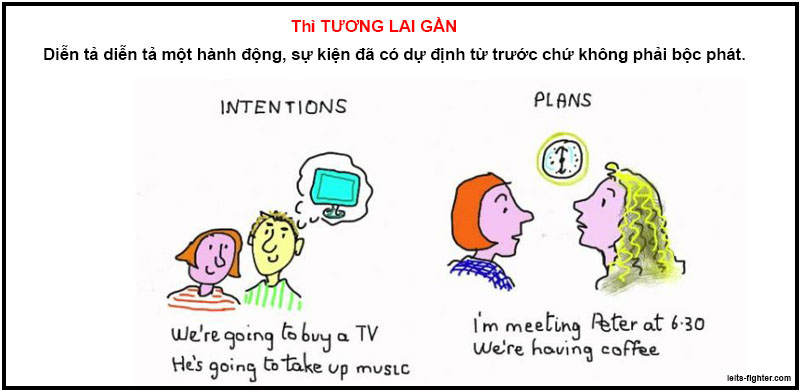
1. Công thức
|
Dạng câu |
Công thức - ví dụ |
|
Khẳng định |
S + am/is/are going to + verb Ví dụ: I am going to the hospital next day |
|
Phủ định |
S + am/is/are not going to + verb Ví dụ: We are not going to school tomorow. |
|
Nghi vấn |
Am/Is/Are + S + going to + verb? Ví dụ: When are you going to Hanoi? |
2. Cách dùng
- Dùng để diễn tả một dự định, kế hoạch trong tương lai (Ví dụ: He is going to married this year.).
- Dùng để diễn đạt một dự đoán có căn cứ, có dẫn chứng cụ thể ( Ví dụ: The sky is very black. It is going to rain).
3. Dấu hiệu nhân biết
Thì tương lai gần sử dụng các trạng từ chỉ thời gian trong tương lai có căn cứ và dẫn chứng cụ thể.
Ví dụ: Tomorrow I am going to visit my parents in New York. I have just bought the ticket.
Trong đó, "tomorrow" là thời gian trong tương lai, "I have just blought the ticket" là dẫn chứng cụ thể cho việc sẽ "visit parents in New York".
11. Thì tương lai tiếp diễn
Tương lai tiếp diễn (Future Continuous) là thì dùng để diễn tả một hành động sẽ xảy ở một thời điểm nhất định nào đó trong tương lai.
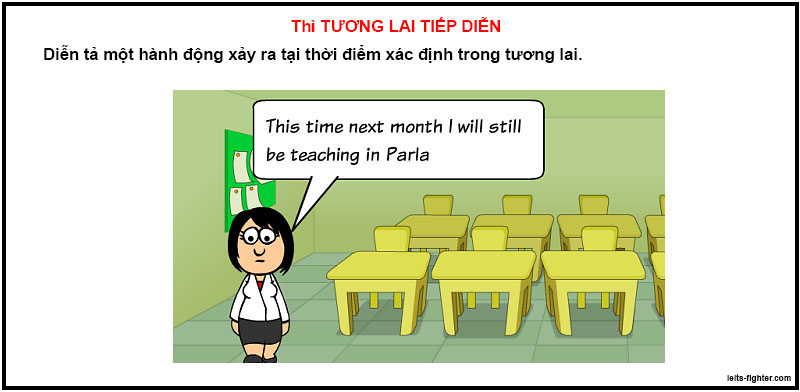
1. Công thức
|
Dạng câu |
Công thức - ví dụ |
|
Khẳng định (+) |
S + will + be + V-ing Ví dụ: I will be going home at 9.am tomorrow. |
|
Phủ định (-) |
S + will not + be+ V-ing Ví dụ: I will not be going home at 9.am tomorrow. |
|
Nghi vấn (?) |
Will + S + be + V-ing? Ví dụ: Will you be going home at 9.am tomorrow? |
2. Cách dùng
Được dùng để diễn tả một hành động xảy ra tại thời điểm xác định trong tương lai.
3. Dấu hiệu nhân biết
Trong câu có các trạng từ chỉ thời gian trong tương lai kèm theo thời điểm xác định:
- At this time/ at this moment + thời gian trong tương lai (Ví dụ: Vào thời điểm này...).
- At + giờ cụ thể + thời gian trong tương lai (Ví dụ: Vào lúc...).
4. Bài tập:
- At this time tomorrow, I______ (go) shopping in Singapore.
- I ______(send) in my application tomorrow
- ___you___ (wait) for her when her plane arrives tonight?
Đáp án:
- Will be going
- Will be sending
- Will you be waiting
12. Thì tương lai hoàn thành
Tương lai hoàn thành (Future Perfect) là thì được dùng để diễn tả một hành động sẽ hoàn thành tại một thời điểm xác định trong tương lai.
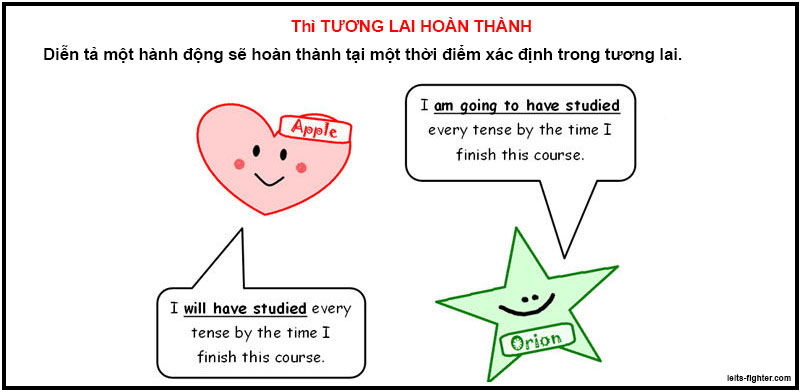
1. Công thức
|
Dạng câu |
Công thức - ví dụ |
|
Khẳng định (+) |
S + will + have + Vpp Ví dụ: I will have watched my favourite film at the end of this month |
|
Phủ định (-) |
S + will + not + have + Vpp Ví dụ: She will not have finished this project tomorrow |
|
Nghi vấn (?) |
Will + S + have + Vpp? Ví dụ: Will you have finished this plan at the end of this week? |
2. Cách dùng
Thì này được dùng để diễn tả một hành động sẽ hoàn thành tại một thời điểm xác định trong tương lai.
3. Dấu hiệu nhận biết
Là những cụm từ:
- by + thời gian trong tương lai.
- by the end of + thời gian trong tương lai.
- by the time…
- before + thời gian trong tương lai.
Ví dụ: Will you have come back before theo Partty
4. Bài tập:
- By the end of this month I______ (take) an English course
- She______(finish) writing the report before 8 o'clock
- The film ______(start) by the time we get to the cinema.
Đáp án:
- will have taken
- will have finished
- will (already) have started
13. Thì tương lai hoàn thành tiếp diễn
Tương lai hoàn thành tiếp diễn (Future Perfect Continuous) là thì được dùng để diễn tả một hành động sẽ xảy ra ở một thời điểm nhất định nào đó trong tương lai.
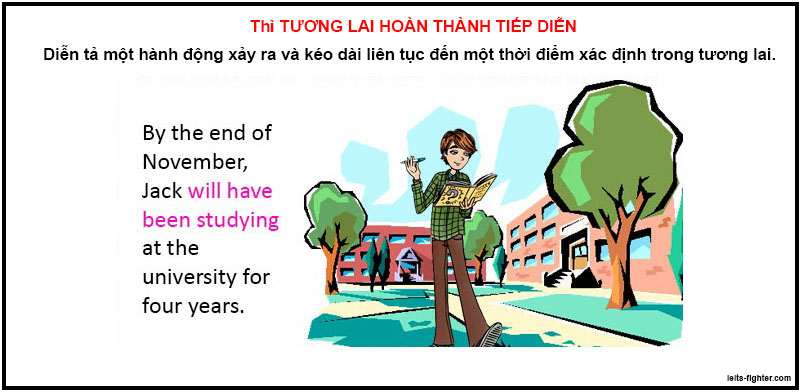
1. Công thức
|
Dạng câu |
Công thức - ví dụ |
|
Khẳng định |
S + will + have + been +V-ing Ví dụ: I will have been studying for 4 years by next month. |
|
Phủ định |
S + will not/won’t + have + been + V-ing Ví dụ: He won’t have been studying at 9 p.m tomorrow. |
|
Nghi vấn |
Will + S + have + been + V-ing? Ví dụ: Will you have been walking around VietNam at the next month? |
2. Cách dùng
- Được sử dụng để diễn tả một hành động xảy ra và kéo dài liên tục đến một thời điểm xác định trong tương lai (Ví dụ: I will have been dating with her for 3 years by next month.).
- Thể hiện sự liên tục của hành động so với một hành động khác trong tương lai (Ví dụ: He will have been travelling by bus by the time he work at this company.).
3. Dấu hiệu nhận biết
Thì tương lai hoàn thành tiếp diễn sử dụng các trạng từ chỉ thời gian:
- By… for + khoảng thời gian.
- By then...
- By the time...
*Lưu ý: Thì tương lai hoàn thành tiếp diễn không dùng với những mệnh đề có bắt đầu những từ chỉ thời gian như: Before, after, when, while, by the time, as soon as, if, unless,…
Một số từ không dùng ở dạng tiếp diễn cũng như thì tương lai hoàn thành tiếp diễn.
- State: be, mean, suit, cost, fit,
- Possession: belong, have
- Senses: smell, taste, feel, hear, see, touch
- Feelings: like, love, prefer, hate, hope, regret, want, wish
- Brain work: believe, know, think (nghĩ về), understand
Nếu có dự định trước thì bạn có thể dùng "be going to" thay thế cho "will" nhé.
Dạng bị động của tương lai hoàn thành tiếp diễn:
will have been being + Vpp
Ví dụ: "I will have been writing my essay for one day by the time." -> "My esay have been being written by me for one day by the time the final exam is came."
4. Bài tập:
- He ______ (write) this book for 3 months by the end of this week.
- They ( talk)______with each other for an hour by the time I get home.
- My mother (cook)______dinner for 3 hours by the time our guests arrive at my house.
Đáp án:
- Will have been writing.
- Will have been talking.
- Will have been cooking.
B. Bài tập vận dụng
Exercise 1. Bài tập thì hiện tại đơn - Điền dạng đúng của từ trong ngoặc
1. She always ______delicious meals. (make)
2. Tome______eggs. (not eat)
3. They______(do) the homework on Sunday.
4. He ______ a new T-shirt today. (buy)
5. My mom ______ shopping every week. (go)
6. ______Duong and Hoa ______ to work by bus every day? (go)
7. _____ your parents ______with your decision? (agree)
8. My sister ______ her hair every day (wash)
9. Police ______ robbers (catch)
Đáp án:
1 - Makes; 2 - Does not eat; 3 - Don't; 4 - Buys; 5 - Goes
6 - Do – go; 7 - Do – agree; 8 - Washes; 9 - Catch;
Exercise 2. Bài tập thì hiện tại tiếp diễn - Viết câu dưới đây ở thì HTTD.
1. My/ dad/ water/ some plants/ the/ garden.
________________________
2. My/ mom/ clean/ floor/.
________________________
3. Mary/ have/ lunch/ her/ friends/ a/ restaurant.
________________________
4. They/ ask/ a/ man/ about/ the/ way/ the/ railway/ station.
________________________
5. My/ student/ draw/ a/ beautiful/ picture
________________________
Đáp án:
1 - My dad is watering some plants in the garden.
2 - My mom is cleaning the floor.
3 - Mary is having lunch with her friends in a restaurant.
4 - They are asking a man about the way to the railway station.
5 - My student is drawing a (very) beautiful picture.
Exercise 3. Bài tập thì hiện tại hoàn thành - Chia động từ trong ngoặc.
1. They ______a new lamp. (buy)
2. We ______our holiday yet. (not/ plan)
3. He just ______ out for 2 hours (go)
4. I ______ my plan (not/finish)
5. ______ you ______ this lesson yet? ( learn)
Đáp án:
1 - Have bought
2 - Haven't planned
3 - Has gone
4 - Haven't finished
5 - Have - learned
Exercise 4: Use the correct form of verbs in brackets.
1. In all the world, there (be) __________ only 14 mountains that (reach) __________above 8,000 meters.
2. He sometimes (come) __________ to see his parents.
3. When I (come) __________, she (leave) __________for Dalat ten minutes ago.
4. My grandfather never (fly) __________ in an airplane, and he has no intention of ever doing so.
5. We just (decide) __________ that we (undertake) ____________ the job.
6. He told me that he (take) __________ a trip to California the following week.
7. I knew that this road (be) __________ too narrow.
8. Right now I (attend) __________ class. Yesterday at this time I (attend) __________class.
9. Tomorrow I'm going to leave for home. When I (arrive) __________at the airport, Mary (wait) __________ for me.
10. Margaret was born in 1950. By last year, she (live) __________on this earth for 55 years .
11. The traffic was very heavy. By the time I (get) __________to Mary's party, everyone already (arrive) __________
12. I will graduate in June. I (see) __________ you in July. By the time I (see) __________ you , I (graduate) __________.
13. I (visit) __________ my uncle's home regularly when I (be) __________ a child.
14. That book (be) __________ on the table for weeks. You (not read) __________ it yet ?
15. David (wash) __________ his hands. He just (repair) __________ the TV set.
16. You (be) __________here before? Yes, I (spend) __________ my holidays here last year.
17. We never (meet) __________ him. We don't know what he (look) __________ like.
18. The car (be) __________ ready for him by the time he (come) __________tomorrow.
19. On arriving at home I (find) __________that she just (leave) __________a few minutes before.
20. When we (arrive) __________ in London tonight, it probably (rain) __________.
21. It (rain) __________ hard. We can't do anything until it (stop) __________
22. Last night we (watch) __________TV when the power (fail) __________.
23. That evening we (stay) __________up to talk about the town where he (live) __________for some years.
24. I (sit) __________down for a rest while the shoes (repair) __________.
25. Half way to the office Paul (turn) __________round and (go) __________back home because he (forget) __________to turn the gas off.
26. London (change) __________a lot since we first (come) __________ to live here.
27. While we (talk) __________on the phone the children (start) __________fighting and (break) __________a window
28. He used to talk to us for hours about all the interesting things he (do) __________ in his life.
29. You know she (stand) __________looking at that picture for the last twenty minutes.
30. I (spend) __________ a lot of time travelling since I (get) __________this new job.
31. When we (be) __________ at school we all (study) __________Latin.
32. When I (meet) __________ him , he (work) __________as a waiter for a year.
33. After he (finish) __________ breakfast he (sit) __________down to write some letters.
34. She (have) __________a hard life, but she's always smiling.
35. I think Jim (be) __________ out of town.
Đáp án:
1. are - reach; 2. comes; 3. came - had left; 4. has never flown;
5. have just decided -would undertake; 6. would take; 7. was ;
8. am attending - was attending; 9. arrive -will be waitin;g 10. had lived;
11. got- had already arrived; 12. will see - see - will have graduated;
13. visited -was; 14. has been - haven’t you read; 15. is washing - has just repaired;
16. Have you been - spent; 17. have never met - looks; 18. will have been- comes;
19. found – had just lef;t 20. arrive – will probably be raining; 21. is raining - stops;
22. were watching - failed ; 23. stayed – had lived; 24. sat – were being repaired;
25. turned – went – had forgotten; 26. has changed - came;
27. were talking – started - broke; 28. had done 29. has been standing;
30. have spent - got; 31. were - studied; 32. met – had been working;
33. had finished - sat; 34. has; 35. has been;
Exercise 5: Choose the best answer among A, B, C, or D.
1. When I last saw him, he _____ in London.
A. has lived
B. is living
C. was living
D. has been living
2. We _______ Dorothy since last Saturday.
A. don’t see
B. haven’t seen
C. didn’t see
D. hadn’t seen
3. The train ______ half an hour ago.
A. has been leaving
B. left
C. has left
D. had left
4. Jack ______ the door.
A. has just painted
B. paint
C. will have painted
D. painting
5. My sister ________ for you since yesterday.
A. is looking
B. was looking
C. has been looking
D. looked
6. I ______ Texas State University now.
A. am attending
B. attend
C. was attending
D. attended
7. He has been selling motorbikes ________.
A. ten years ago
B. since ten years
C. for ten years ago
D. for ten years
8. Christopher Columbus _______ American more than 500 years ago.
A. discovered
B. has discovered
C. had discovered
D. had been discovering
9. He fell down when he ______ towards the church.
A. run
B. runs
C. was running
D. had run
10. We _______ there when our father died.
A. still lived
B. lived still
C. was still lived
D. was still living
11. They ______ table tennis when their father comes back home.
A. will play
B. will be playing
C. play
D. would play
12. By Christmas, I _______ for Mr. Smith for six years.
A. will have been working
B. will work
C. have been working
D. will be working
13. I _______ in the room right now
A. am being
B. was being
C. have been being
D. am
14. I ______ to New York three times this year.
A. have been
B. was
C. were
D. had been
15. I’ll come and see you before I _______ for the States.
A. leave
B. will leave
C. have left
D. shall leave
16. The little girl asked what _______ to her friend.
A. has happened
B. happened
C. had happened
D. would have been happened
17. John ______ a book when I saw him.
A. is reading
B. read
C. was reading
D. reading
18. He said he _______ return later.
A. will
B. would
C. can
D. would be
19. Jack ________ the door.
A. has just opened
B. open
C. have opened
D. opening
20. I have been waiting for you ______ .
A. since early morning
B. since 9 a.m
C. for two hours
D. All are correct
21. Almost everyone _______ for home by the time we arrived.
A. leave
B. left
C. leaves
D. had left
22. By the age of 25, he ______ two famous novels.
A. wrote
B. writes
C. has written
D. had written
23. When her husband was in the army, Mary ______ to him twice a week
A. was reading
B. wrote
C. was written
D. had written
24. I couldn’t cut the grass because the lawn mower ______ a few days previously.
A. broke down
B. has been broken
C. had broken down
D. breaks down
25. I have never played badminton before. This is the first time I _____ to play.
A. try
B. tried
C. have tried
D. am trying
26. Since _______, I have heard nothing from him.
A. he had left
B. he left
C. he has left
D. he was left
27. After I _______ lunch, I looked for my bag.
A. had
B. had had
C. have has
D. have had
28. By the end of next year, George _______ English for two years.
A. will have learned
B. will learn
C. has learned
D. would learn
29. The man got out of the car, ________ round to the back and opened the book.
A. walking
B. walked
C. walks
D. walk
30. Henry _______ into the restaurant when the writer was having dinner.
A. was going
B. went
C. has gone
D. did go
31. He will take the dog out for a walk as soon as he ______ dinner.
A. finish
B. finishes
C. will finish
D. finishing
32. I will be glad if he _______ with us.
A. had gone
B. did go
C. went
D. goes
33 Ask her to come and see me when she _______ her work.
A. finish
B. has finished
C. finished
D. finishing
34. Turn off the gas. Don’t you see that the kettle ________ ?
A. boil
B. boils
C. is boiling
D. boiled
35. Tom and Mary ______ for Vietnam tomorrow.
A. leave
B. are leaving
C. leaving
D. are left
36. He always ________ for a walk in the evening.
A. go
B. is going
C. goes
D. going
37. Her brother ______ in Canada at present.
A. working
B. works
C. is working
D. work
38. I ______ to the same barber since last year.
A. am going
B. have been going
C. go
D. had gone
39. Her father ______ when she was a small girl.
A. dies
B. died
C. has died
D. had died
40. Last week, my professor promised that he ________ today.
A. would come
B. will come
C. comes
D. coming
Đáp án:
|
1. C |
2. B |
3. B |
4. A |
5. C |
6. A |
7. D |
8. A |
9. C |
10. A |
|
11. B |
12. A |
13. D |
14. A |
15. A |
16. C |
17. C |
18. B |
19. A |
20. D |
|
21. D |
22. D |
23. B |
24. C |
25. C |
26. B |
27. B |
28. A |
29. B |
30. B |
|
31. B |
32. D |
33. B |
34. C |
35. B |
36. C |
37. C |
38. B |
39. B |
40. A |
Exercise 6: Choose the underlined part in each sentence (A, B,C, or D ) that needs correcting
1. After Mrs. Wang had returned (A) to her house (B) from work (C), she was cooking (D) dinner.
2. Jimmy threw (A) the ball high (B) in the air, and Betty catching (C) it when (D) it came down.
3. Linda has worn (A) her new yellow (B) dress only once (C) since she buys (D) it.
4. Last week Mark told (A) me that he go (B)t very bored with his present job and is looking (C) for a new on (D)e.
5. Having (A) fed the dog, he was sat (B) down to (C) his own (D) meal.
6. When I turned on my computer, I was shocked (A) to find (B) some junk mail, and (C) I delete (D) it all.
7. They are going to have to (A) leave soon (B) and so do (C) we (D).
8. The boss laughed when the secretary has told (A) him that she really (B) needed (C) a pay (D) rise.
9. The telephone rang several times (A) and then (B) stop (C) before I could (D) answer it.
10. Debbie, whose father (A) is an excellent tennis player(B), has been (C) playing tennis since (D) ten years.
11. I have seen (A) lots(B) of interesting (C) places when I went (D) on holiday last summer.
12. When my cat heard (A) a noise in the bushes, she stopped moving (B) and listen (C) intently (D).
13. I think (A) it’s time you change (B) your way of (C) living (D).
14. Roger felt the outside (A) of his pocket to make (B) sure his (C) wallet is still (D) there.
15. When I’m shopping (A) in the supermarket, I ran into (B) an old friend who I hadn’t met (C) for (D) five years.
16. The police (A) arrested the man while (B) he is having (C) dinner in (D) a restaurant.
17. Peter and Wendy first (A) met in 2006 (B), and they are (C) married for three years now (D).
18. Some (A) people are believing (B) there is life on (C) other (D) planets.
19. Recently, the island of Hawaii (A) had been (B) the subject of intensive research (C) on the occurrence (D) of earthquakes.
20. Every morning, the sun shines (A) in my bedroom window (B) and waking (C) me up (D).
21. The man died as (A) a result of falling (B) asleep (C) while he drives (D).
22. I haven’t finished (A) the report yet (B),but by the time you return (C) I will certainly complete (D) it.
23. Caroline has worn (A) her new yellow (B) dress only once (C) since she buys (D) it.
24. We’ll be cycled (A) to Hoa’s village (B) at (C) this time next (D) Sunday.
25. What will (A) you do (B) when (C) your friends won’t come (D) ?
26. Someone was knocking (A) at the door (B) when I was doing (C) the washing up (D).
27. My friend didn’t drink (A) any (B) beer since we came (C) to live here (D).
28. We have written (A)to each other (B) when (C) we were (D) in primary school.
29. After (A) breakfast, I‘m gone (B) to walk to (C) school with (D) my friends.
30. Did (A) he go to (B) the pop concert next weekend (C) for a change (D)?
Đáp án:
1. D. was cooking -> cooked
2. C. catching -> caught
3. D. buys -> bought
4. C. is looking -> was looking
5. B. was sat -> sat
6. D. delete -> deleted
7. C. so do -> so are
8. A. has told -> told
9. C. stop -> stopped
10. D. since -> for
11. A. have seen -> saw
12. C. listen -> listened
13. B. change -> changed
14. D. is still -> was still
15. A. I’m shopping -> was shopping
16. C. is having -> was having
17. C. are -> have been
18. B. are believing -> believe
19. B. had been -> has been
20. C. waking -> wakes
21. D. drives -> was driving
22. D. will certainly complete -> will have certainly completed
23. D. buys -> bought
24. A. We’ll be cycled -> We’ll be cycling
25. D. won’t come -> don’t come
26. A. was knocking -> knocked
27. A. didn’t drink -> hasn’t drunk
28. C. when -> since
29. B. gone -> going
30. A. Did -> Will
Exercise 7: Choose the correct sentence among A, B, C or D which has the same meaning as the given one.
1. Eight years ago we started writing to each other.
A. We have rarely written to each other for eight years.
B. Eight years is a long time for us to write to each other.
C. We wrote to each other eight years ago.
D. We have been writing to each other for eight years.
2. The boy was so lazy that he couldn't stay up late to learn his lessons.
A. The boy was lazy enough not to stay up late to learn his lessons.
B. The boy was too lazy to stay up late to learn his lessons.
C. The boy was lazy enough but he stayed up late to learn his lessons.
D. The boy was lazy enough to stay up late to learn his lessons.
3. My father is tired of seeing any violent films.
A. My father hasn't seen a violent film.
B. My father has enjoyed all the violent films he has ever seen.
C. My father is worried about missing the next violent film.
D. My father never wants to see another violent film.
4. As soon as he waved his hand, she turned away.
A. He saw her turn away and he waved his hand.
B. No sooner had he waved his hand than she turned away.
C. She turned away because he waved his hand too early.
D. Although she turned away, he waved his hand.
5. John wishes he had remembered to send Mary a Christmas card.
A. John regrets not to send Mary a Christmas card.
B. John regrets forgetting not to send Mary a Christmas card.
C. John regrets not remembering sending Mary a Christmas card.
D. John regrets forgetting to send Mary a Christmas card.
6. My father hasn't smoked cigarettes for a month.
A. It's a month since my father last smoked cigarettes.
B. It's a month ago that my father smoked cigarettes.
C. It's a month that my father hasn't smoked cigarettes.
D. It's a cigarette that my father smoked a month ago.
7. Having finished their work, the workers expected to be paid.
A. The workers expected to be paid because they had finished their work.
B. Having their work finishing, the workers expected to be paid.
C. Having expected to be paid, the workers finished their work.
D. Having been finished their work, the workers expected to be paid.
8. Mr. Brown bought this car five years ago.
A. Mr. Brown started to buy this car for five years.
B. It has been five years when Mr. Brown has bought this car.
C. Mr. Brown has had this car for five years .
D. It is five years ago since Mr. Brown has bought this car.
9. John used to write home once a week when he was abroad.
A. John doesn't write home once a week any longer.
B. John enjoyed being written home every week when he was abroad.
C. John never forgot to write a weekly letter home when he was abroad.
D. When he was abroad he remembered to write home every week.
10. I haven't enjoyed myself so much for years.
A. It's years since I enjoyed myself so much.
B. It's years since I have enjoyed myself so much.
C. It was years since I had enjoyed myself so much.
D. It has been years since I have enjoyed myself so much.
Đáp án:
1. D; 2. B; 3. D; 4. B; 5. D; 6. A; 7. A; 8. C; 9. A; 10. A;
Exercise 8: Give the correct form of the word in brackets.
1. He went to his house, lied down on the bed, and (sleep) ……………… right away.
2. I (buy) ……………… the ticket yesterday. I am (go) ……………… Dalat tomorrow.
3. Tim (attend) ……………… the meeting at school at the moment.
4. He (have not) ……………… English for 2 years.
5. Our class (start) ……………… at 9am.
6. I always (brush) ……………… my teeth before I go to bed.
7. I (study) ……………… English since I was 21.
8. He was listening to music when his boss (come) ……………… yesterday.
9. I (have do) ……………… all the homework all afternoon.
10. I (be) ……………… a student.
11. She (wait) ……………… you for all day.
12. He wasn’t working when his boss (call) ……………… him yesterday.
13. She (be) ……………… at her boyfriend’s house yesterday morning.
14. I (talk) ……………… to my father at the moment.
15. We (be) ……………… in Nhatrang on their summer holiday last year.
16. The sun (rise) ……………… in the east.
17. He (meet) ……………… his old friend near his house yesterday.
18. The World Cup (take place) ……………… every four years.
19. They (play) ……………… in the garden at 4 pm yesterday.
20. She was watching a picture while her mother (cook) ……………… soup.
21. They (play) ……………… now.
22. Anne was riding her bike to school when Peter (see) ……………… her yesterday.
Đáp án:
1 - slept; 2 - bought - am going to; 3 - is attending; 4 - has not practised; 5 - starts;
6 - brush; 7 - have studied; 8 - came; 9 - have been doing; 10 - am;
11 - has been waiting; 12 - called; 13 - was; 14 - am talking; 15 - were;
16 - rises; 17 - met; 18 - take place; 19 - were playing; 20 - was cooking;
21 - are playing; 22 - saw;
Exercise 9. Khoanh vào đáp án đúng.
1. He fell down when he …………towards the church.
A. run B. runs C. was running D. had run
2. The train …………. half an hour ago.
A. has been leaving B. left C. has left D. had left
3. He has been selling motorcycles……………..
A. ten years ago B. since ten years C. for ten years ago D. for ten years.
4. I ……..Texas State University now.
A. am attending B. attend C. was attending D. attended.
5. The little girl asked what ……… to her friend.
A. has happened B. Happened C. had happened D. would have been happened.
6. John ……… a book when I saw him.
A. is reading B. read C. was reading D. Reading
7. I………….to New York three times this year.
A. have been B. was C. were D. had been
8. I will come and see you before I………….for America.
A. leave B. will leave C. have left D. shall leave
9. I have never played badminton before. This is the first time I ……… to play.
A. try B. tried C. have tried D. am trying
10. He will take the dog out for a walk as soon as he ……….. dinner.
A. finish B. finishes C. will finish D. finishing
11. When I met him , he ……. as a waiter for a year.
A.had been working B. worked C. have worked D. work.
12. I………….the dishwasher on when heard the shot.
A. am turning B. were turning C. was turning D. turned
13. There was a time when watching TV really……………family entertainment.
A. were B. was C. had been D. Is
14. The Olympic Games…………every four years.
A. take place B. takes place C. took place D. is taking place.
15. …………….you go to the dentist?
A. how often are B. how often do C. how often does D. how are
16. By the end of next year, Kelvin ………English for two years.
A. will have learned B. will learn C. has learned D. would learn.
17. By the age of 25, he …….. two famous novels.
A. wrote B. writes C. has written D. had written
18. I think the weather……………nice later.
A. will be B. be C. had D. has been
Đáp án:
1.C 2.B 3.B 4.A 5.C 6.C 7.A 8.A 9.C 10.B
11.A 12.C 13.B 14.B 15.B 16.A 17.D 18.A
Exercise 10. Supply the correct tense
1. They (just decide)…………………. that they (undertake)…………………. the job.
2. We (go)…………………. to the theatre last night.
3. He usually (write)…………………. in green ink.
4. She (play)…………………. the piano when our guests (arrive)…………………. last night.
5. I (come)…………………. as soon as my work is finished. (You be)…………………. ready?
6. Where (you go)…………………. for your holiday last year?
7. I (not leave)…………………. Paris since we (go)…………………. to Dieppe three years ago.
8. My mother (come)…………………. to stay with us next weekend.
9. We (meet)…………………. only yesterday and (already decide)…………………. to get married.
10. We (not live)…………………. in England for the last two months.
11. I (lose)…………………. my keys. I cannot remember where I last (see)…………………. them.
12. Wherever you (go)…………………. to town nowadays, you (spend)…………………. a lot of money.
13. When I last (stay)…………………. in Cairo, I (ride)…………………. to the Pyramids on a camel that my friend (borrow)…………………. the day before.
14. I (finish)…………………. the book before my next birthday.
15. He (walk)…………………. very quickly when I (meet)…………………. him yesterday.
Đáp án:
1. They (just decide)………have just decided …………. that they (undertake)…………would undertake………. the job.
2. We (go)………went…………. to the theatre last night.
3. He usually (write)………writes…………. in green ink.
4. She (play)………was playing…………. the piano when our guests (arrive)………… arrived………. last night.
5. I (come)……… will come…………. as soon as my work is finished. (You be)………Are you…………. ready?
6. Where (you go)……… did you go …………. for your holiday last year?
7. I (not leave)………… haven’t left………. Paris since we (go)………… went………. to Dieppe three years ago.
8. My mother (come)………will come…………. to stay with us next weekend.
9. We (meet)………met…………. only yesterday and (already decide)………have already decided…………. to get married.
10. We (not live)………haven’t lived…………. in England for the last two months.
11. I (lose)……have lost……………. my keys. I cannot remember where I last (see)…………saw………. them.
12. Wherever you (go)………go…………. to town nowadays, you (spend)…………spend………. a lot of money.
13. When I last (stay)………stayed…………. in Cairo, I (ride)……… rode…………. to the Pyramids on a camel that my friend (borrow)……………had borrowed……. the day before.
14. I (finish)………will have finished…………. the book before my next birthday.
15. He (walk)………was walking …………. very quickly when I (meet)………met…………. him yesterday.
Exercise 11. Choose the correct answer.
1. My friend_____________ to the museum last weekend.
A. goes
B. went
C. had gone
D. have gone
2. Thu and Lan______________ close friends for years.
A. are
B. were
C. had been
D. have been
3. Our Singaporean friends_______________ to visit our school last year.
A. is coming
B. come
C. came
D. have come
4. We_____________ Malaysia last summer.
A. visited
B. were visiting
C. are visiting
D. have visited
5. The students used to______________ football in that stadium.
A. played
B. play
C. playing
D. are playing
6. Her parents want him_______________ some good books to read.
A. to choose
B. choose
C. chose
D. choosing
7. Would you like_____________ and visit my country?
A. come
B. coming
C. to come
D. came
8. The children______________ their parents for a long time.
A. didn’t see
B. haven’t seen
C. don’t see
D. haven’t see
9. I and Kenny____________ friends since I____________ Singapore.
A. are-visit
B. were-visited
C. have been-visited
D. were-have visited
10. My children are lucky_____________ the chance to visit the capital again.
A. have
B. having
C. are having
D. to have
11. The children enjoy______________ with their friends through computers.
A. to chat
B. chat
C. chatting
D. chatted
12. Her father used to_______________ abroad for his business.
A. travelling
B. travelled
C. travel
D. is travelling
13. The kids_____________ that show before.
A. didn’t see
B. don’t see
C. aren’t seeing
D. haven’t seen
14. How often______________ you______________ sports? –Twice a week.
A. did-play
B. have-waited
C. do-play
D. did-played
15. How long_______________ you_____________ for me?-For an hour.
A. did-waited
B. do-wait
C. have-waited
D. have-wait
16. Since the worldwide recession of the 1990’s, the sail of jeans __________ growing.
A. stopped
B. was stopped
C. was stopping
D. has stopped
17. Tidal waves_______________ the result of an abrupt shift in the underwater movement of the Earth.
A. are
B. were
C. is
D. was
18. How long ago................. Susan?
A. have you been seeing
B. you saw
C. did you see
D. would you see
19. On the first of next month, he ............... in prison for five years.
A. will have
B. will be being
C. will have been
D. has had
20. He .............. for a job for some weeks before he found one.
A. is looking
B. looks
C. would have been looking
D. had been looking
Đáp án:
1 - B; 2 - D; 3 - C; 4 - A; 5 - B;
6 - A; 7 - C; 8 - B; 9 - C; 10 - D;
11 - C; 12 - C; 13 - D; 14 - C; 15 - C;
16 - D; 17 - A; 18 - C; 19 - C; 20 - D;
Exercise 12. Give the correct form of the word in bracket.
1. My elder sister _______French since November. ( learn)
2. It _____ 5 months since I first met him. (be)
3. I don’t like the newspaper that I _________ at the moment. (read)
4. Travelling by plane ______ a lot of energy. (use)
5. The amount of free time we have ________ continuously for over 20 years. (rise)
6. I ______ (swim) in the sea when the rain started.
7. If I ______(know) that, I would have acted differently.
8. I _____ (try) my best to answer all the questions tomorrow.
9. Everyone _______ (learn) how to use the Internet in 50 years time.
10. Last month I ______(have) acting lessons but I had to stop when I lost my voice.
Đáp án:
1. My elder sister __has been learning_____French since November. ( learn)
2. It __has been___ 5 months since I first met him. (be)
3. I don’t like the newspaper that I ____am reading___ at the moment. (read)
4. Travelling by plane __uses____ a lot of energy. (use)
5. The amount of free time we have ____has been raising____ continuously for over 20 years. (rise)
6. I ____was swimming__ (swim) in the sea when the rain started.
7. If I ____had known__(know) that, I would have acted differently.
8. I ___will try__ (try) my best to answer all the questions tomorrow.
9. Everyone ___will have learnt____ (learn) how to use the Internet in 50 years time.
10. Last month I ____was having__(have) acting lessons but I had to stop when I lost my voice.
Exercise 13. Past Tense – Simple or Progressive: Fill in the correct form.
1. He suddenly (realize)___________ that he (travel)____________ in the wrong direction.
2. He (play)________________ guitar when someone (open)________________ the window and (throw)________________ out a bucket of water.
3. He (not allow)________________ us to go out in the boat yesterday because a strong wind
(blow)________________ .
4. The next day, as they (know)________________ that the police (look)________________ for them, they (hide)________________ the coats in the woods and (go_________________ off in different directions.
5. When I (come)________________ home they (sit)________________ around a fire. Jack (do)________________ a crossword puzzle, Judy (knit)________________ and the others (read)________________ . Mother (smile) ________________ at me and said : “ Come and sit down”.
Đáp án:
1. He suddenly (realize)_____ realized______ that he (travel)______was travelling______ in the wrong direction.
2. He (play)________was playing________ guitar when someone (open)_______ opened_________ the window and (throw)__________threw______ out a bucket of water.
3. He (not allow)_________did not allow_______ us to go out in the boat yesterday because a strong wind (blow)______was blowing__________ .
4. The next day, as they (know)________knew________ that the police (look)________were looking________ for them, they (hide)________hid________ the coats in the woods and (go________went_________ off in different directions.
5. When I (come)________came________ home they (sit)________were sitting________ around a fire. Jack (do)_________was doing_______ a crossword puzzle, Judy (knit)_______was knitting_________ and the others (read)__________were reading______ . Mother (smile) ______smiled__________ at me and said : “ Come and sit down”.
Exercise 14. Choose the correct tense for each sentence
1. I’ll be right with you as soon as I _________________ my keys.
A. will find
B. found
C. find
D. will have found
2. Next month I have a week’s vacation. I ____________ on going on a trip to the Rockies.
A. am planning
B. have planned
C. will plan
D. will be planning
3. Jim, why don’t you take some time off. You _________________ too hard lately.
A. are working
B. were working
C. had been working
D. have been working
4. It’s against the law to kill whales. They _________________ extinct.
A. have become
B. become
C. became
D. are becoming
5. I _________________ all the questions correctly since I began the course.
A. had answered
B. have been answering
C. have answered
D. answered
Đáp án:
1 - C; 2 - A; 3 - D; 4 - D; 5 - C;
Exercise 15. Choose the correct answer to complete the sentence.
1. While I _________________ TV last night a small mouse ran across the room.
A. watched
B. have watched
C. watch
D. was watching
2. Jane isn’t here yet. I _________________ since noon but there is no sign of her.
A. have waited
B. am writing
C. wait
D. have been waiting
3. By the time my brother finally graduated from high school, he _________________ seven different schools.
A. attended
B. was attending
C. had attended
D. had been attending
4. On June 20th I returned home. I _________________ for almost two years.
A. was away
B. have been away
C. am away
D. had been away
5. When I got to the party, many people _________________.
A. danced
B. had already danced
C. have already danced.
D. were already dancing – already
6. Before I started the car, all of the passengers _________________ their seat belts.
A. will buckle
B. will have buckled
C. had buckled
D. buckle
7. Right now we _________________ a heat wave. It’s been so hot for almost a week.
A. have
B. have had
C. have been having
D. are having
8. When I go and see the doctor this afternoon I _________________ him to take a look at my throat.
A. will ask
B. asked
C. will have asked
D. ask
9. I sent you the money almost a week ago but I still _________________ any confirmation.
A. hadn’t received
B. didn’t receive
C. haven’t received
D. am not receiving
10. After they _________________ the race the celebrations began.
A. won
B. have won
C. win
D. had won
Đáp án:
1 - D; 2 - D; 3 - C; 4 - D; 5 - D;
6 - C; 7 - D; 8 - A; 9 - C; 10 - D;
Exercise 16. Give the correct form of verbs in brackets
1. When Melanie came into the office yesterday, her eyes (be) ___________ red and watery. I think she (cry) ___________.
2. By the time we get to Chicago this evening, we (drive) ___________ more than four hundred miles. We are going to be exhausted.
3. At 6 o’clock on next Friday they (sing) ___________ the new song.
4. When he (wake up) ___________ yesterday, his mother (already/ prepare) ___________ breakfast.
5. When Sarah goes on vacation next month, she (study) ___________German for over two years. She should be able to communicate fairly well while she is in Austria.
6. (you/ ever/ see) ___________ a whale?
7. I have not traveled much yet; however, I (visit) ___________ the Grand Crayon and San Francisco by the time I leave the United States.
8. I (finish) ___________ it by the end of this month.
9. By the time you finish studying the verb tense tutorial, you (master) ___________ all tweleve tenses including their passive forms.
10. I (just/ finish) ___________ my homework.
Đáp án:
1. When Melanie came into the office yesterday, her eyes (be) ____were_______ red and watery. I think she (cry) ____had been crying_______.
2. By the time we get to Chicago this evening, we (drive) _____will have driven______ more than four hundred miles. We are going to be exhausted.
3. At 6 o’clock on next Friday they (sing) _____will be singing______ the new song.
4. When he (wake up) ____woke up_______ yesterday, his mother (already/ prepare) ____had already prepared_______ breakfast.
5. When Sarah goes on vacation next month, she (study) ______will have been studying_____German for over two years. She should be able to communicate fairly well while she is in Austria.
6. (you/ ever/ see) ____Have you ever seen_______ a whale?
7. I have not traveled much yet; however, I (visit) ____will have visited_______ the Grand Crayon and San Francisco by the time I leave the United States.
8. I (finish) _____will have finished______ it by the end of this month.
9. By the time you finish studying the verb tense tutorial, you (master) _____will have mastered______ all twelve tenses including their passive forms.
10. I (just/ finish) ____have just finished_______ my homework.
Exercise 17. Put the verbs in the correct form (present simple/ present continuous tense).
1. This afternoon I (see) ________ my doctor about my health.
2. How is your cold today? It (sound) ________ slightly better than yesterday.
3. He normally (read) ________ all the Harry Potter books, but right now I (think) ________ he (read) ________ something else.
4. It is strange that people (take) ________ some movies so seriously.
5. What (your brother, do) ________ for a living? - Well he is a market consultant.
Đáp án:
1. This afternoon I (see) ____am seeing____ my doctor about my health.
2. How is your cold today? It (sound) ____sounds____ slightly better than yesterday.
3. He normally (read) ____reads____ all the Harry Potter books, but right now I (think) ____think____ he (read) ____is reading____ something else.
4. It is strange that people (take) ____take____ some movies so seriously.
5. What (your brother, do) ____does your brother do____ for a living? - Well he is a market consultant.
Exercise 18. Put the verb in brackets in the correct form (present simple or present continuous).
Next week, my friends and I (1. go) ________ camping in the woods. I (2. organize) ________ the food, because I (3. like) ________ cooking. Tom (4. have) ________ a big car with a trailer, so he (5. plan) ________ the transportation. Sam (6. bring) ________ the tent. He (7. go) ________ camping every year, so he (8. have) ________ a great tent and lots of other equipment. My wife (9. think) ________ we’re crazy. She likes holidays in comfortable hotels, so she (10. take) ________ a trip to Paris instead.
Đáp án:
Next week, my friends and I (1. go) ____are going____ camping in the woods. I (2. organize) ____am organizing____ the food, because I (3. like) ____like____ cooking. Tom (4. have) ____has____ a big car with a trailer, so he (5. plan) ____is planning____ the transportation. Sam (6. bring) ____is bringing____ the tent. He (7. go) ____goes____ camping every year, so he (8. have) ____has____ a great tent and lots of other equipment. My wife (9. think) ____thinks____ we’re crazy. She likes holidays in comfortable hotels, so she (10. take) ____is taking____ a trip to Paris instead.
Bài tập tự luyện
1. ............................ (you/have) a nice time in Rome?
2. ............................ (you/finish) your homework yet?
3. He (be)........................ at his computer for six hours.
4. How many people (die)................... in the fire yesterday?
5. I (not/know).................... much about art, but I like some artists.
6. I (wait)...................... for ages when finally the bus arrived.
7. I (receive)....................... a postcard from Jane yesterday.
8. I (never/be).................. sailing, what’s it like?
9. It was late. Most of the shops (close)..................... .
10. It (rain)...................... when I got up this morning.
11. Janet (start)................... a new job in September.
12. Nelly (have) ........................ a great time in New York at the moment.
13. She was cooking dinner when we (arrive).................... .
14. She (just/come) ....................... back from a Mediterranean cruise.
14. When I got the airport I realized I (forget)....................my passport.
15. As soon as they (arrive).....................we had dinner.
16. When they were driving home last night they (see)..............a terrible accident.
17. Where ...............................(Robert/live) now?
18. Who (Mandy/talk)..... …. ..........to?
19. What would he have done if he (be)………..……. there?
20. I am very sorry but I (not finish) …………….……. reading the book yet.
21. She (be)…..………. ill since last Monday. She won’t be able to go to the sea-side next week-end.
22. I decided to learn Greek while we (live)………………… in Delphes.
23. They were going to town when I (see)………….. them this morning.
24. If I (bump) ………….. into a ghost, I think I would run away fast or scream.
25. He was caught after he (wander)……………… in the eastern Highlands all night.
26. We know he (buy)………..…….. a new house in a small lane quite recently, but we don’t know whether he has sold his old house.
27. I have never seen him again since I (leave)…………… Australia in 1964.
28. Who is this lady? She (move)…………… into No 4 last month.
29. This hotel is empty, it (not live)…………..…. in for a long time.
30. Yesterday afternoon he (have)……..……… a nap in the garden chair when a boy dropped a ball on his head.
31.It’s the first time I …………….(eat) this.
32This is the worst storm I ……………(ever see).
33. It was the first time I ……………………(ever see) such a beautiful girl.
34. It was the most exciting film I …………………(ever see).
35. This was the dirtiest looking dog I ……………….(ever see).
36.My friend…………….. (not see) me for many years when I ……… (meet) him last week.
37.After John………………… (wash) his clothes, he (begin) ………….to study.
38.She came into the room when they ……………….(watch) television.
39.As soon as we find another apartment, we ………………. (move).
40.She …………… (play) the piano when our guests ………… (arrive) last night.